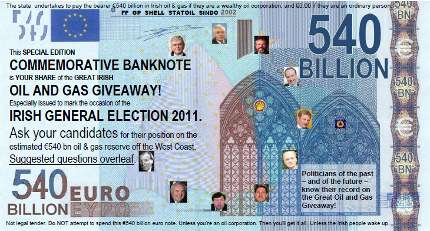“Corrib will pay no tax” – Brian O’ Cathain – former Enterprise Energy Ireland chief
 national |
miscellaneous |
opinion/analysis
national |
miscellaneous |
opinion/analysis  Sunday February 13, 2011 15:25
Sunday February 13, 2011 15:25 by Paul Lynch - RSC
by Paul Lynch - RSC
A former chief of the Corrib Gas Project proclaimed that “Corrib will pay no tax” owing to the billions already spent on the decade late project.
Brian O’ Cathain - who was managing Director of Enterprise Energy Ireland before the company was bought out by Shell in 2002 - made the startling claim just before last December’s budget.
The statement was made during a panel discussion convened at the Irish Film Institute in Dublin concerning the issues brought up by “The Pipe” - a documentary film about the Corrib Gas Controversy. Ironically the claim was made to defend the current terms and conditions for oil and gas exploration and production in Ireland.
He said that because of the billions spent on the over-budget, over-time project the venture will never be profitable and the revenue from the gas sales would go to trying to break even on the venture.
Even if we were to believe that Shell may be happy to break even on Corrib, there is more method to the corporation’s madness. A confidential US embassy cable leaked by the Wikileaks website reports that Julian Cetti, Shell Ireland’s head of commercial and business strategy, said the lucrative Corrib gas field and another development planned by the US firm Hess in the Shannon area would be enough to meet domestic gas demands for many years.
The cable, sent in April 2008 from the US embassy in Dublin and marked confidential, states Cetti said "there ‘could be 20 or more Corribs out there — or very little — depending on how the exploratory drilling progresses this year’."
Evidence from our own government would support the higher end estimates of Ireland’s oil and gas reserves. A 2006 report into the matter concluded that there is about 10 billion barrels of oil equivalent oil and gas recoverable of the west coast alone. With an average value of oil at $60 dollars a barrel for 2010, this equates to €600 billion worth of resources. Maddeningly this is literally being given away to the oil companies with no guarantee of any revenue to the state.
Ministers Ray Burke and Bertie Ahern changed Irish law in 1987 & 1992 so that multinational oil companies:
• Own 100% of the oil and gas they find under Irish waters;
• Pay no royalties on it;
• Can write off 100% of their costs against tax, even costs incurred in other countries;
• Have profits taxed at 25%, compared to an international average of 68% for oil-producing countries;
• Can export the oil or gas outside Ireland;
• Can sell to Bord Gais at full market rates.
This was not always the case. The 1975 terms and conditions provided for:
• Up to 50% state ownership of any find
• 8 – 16% royalties payable by the oil companies to the state on production
• 50% corporation tax on profits
The 1975 terms were modelled on Norway’s oil and gas regime. Because of wise management Norway has no national debt, free universal health care, and billions in the bank for its pensioners. A return to such a regime would guarantee that the Irish state benefits from any exploitation of one of its greatest resources.
